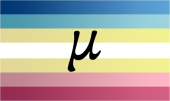One of our staff members is contributing considerably to a News Archiving service at Mu. Any well educated (Masters, PhD or above) users who wish to make comments on news sites, please contact Jim Burton directly rather than using this list, and we can work on maximising view count.
Minor attracted community
 | |||||||
| Part of NewgonWiki's series on minor-attracted identities | |||||||
|---|---|---|---|---|---|---|---|
|
| |||||||
| Starting Guide | Community | Pediverse MAP | NOMAP | AAM | Neologisms "MAP" Origins | Flag | Movement Political history: MAP & LGBT Alliances Philias: Ephebo - Hebe - Pedo - Nepio Gender and attraction: BL - EL - GL Pederasty/Gay BL | Korephilia/Lesbian GL Pro-c | Neutral-c | Anti-c BLogo | GLogo | |||||||
|
| |||||||
| Category: Minor-attracted people | |||||||
| Template:MAI - This template |
The minor-attracted community is a term that can be applied to a non-campaigning social group including ephebophiles, pedophiles and other interested parties who at this point, generally interact with each other via just a few small, legitimite websites on the Internet. Some of these websites go under banners such as boylove and girllove, with others remaining generic. In some cases, relationships forged through these websites have lead to real-life contacts, and even large scale meetings and events (see IBLD or Ipce).
However, because of the intense persecution of minor-attracted persons and the greater anonymity offered by the Internet, many boylovers and girllovers feel more comfortable finding friends and confidants online than in real life. As such, the online community has grown since around 1997, with sites such as BoyChat establishing themselves as important meeting places.
Message boards
One of the most popular ways to participate in this online community is through message boards (also known as Bulletin Board System-style, or BBS-style, forums). These are websites (for example, BoyChat, GirlChat and Visions of Alice) in which posters write messages to one another. The messages remain available for long periods of time while other posters read and respond to them.
Fediverse
Decentralized social platforms such as Mastodon and Pleroma have seen very impressive uptake among MAPs, who communicate on shared servers.[1] Participants in decentralized networking may themselves offer up server space. These are noncommercial spaces for shared interests, and often deviate from the mainstream, so while uptake is high, visibility for activists might be poorer in this instance.
Modern Mainstream
Small communities, including some activism have been seen on Twitter, Tumblr, Reddit, Quora and Discord. YouTube carries out a lot of censorship, but appears to have large numbers of receptive commenters for most alternative points of view. Gab is said to have carried out censorship, despite it's supposed reputation for freedom of speech.
Real-time chat
Another common way of interacting with the online community is via real-time chat services such as that offered by websites such as LifeLine, linked to from BoyChat and MSC, supported by Prostasia Foundation. These communities have the advantage of permitting instant response and reaction to one's communications, with the disadvantage of being fleetingly ephemeral with regards to their content. IRC, along with Usenet, was the core of the online boylove community before the rise in popularity of BL message boards.
Messenger apps
Private messenger apps are also used, along with email services that may or may not be used with Tor or VPNs. These messaging apps may have varying levels of decentralization and encryption
Usenet
Usenet, often simply referred to as "newsgroups" was arguably the birthplace of the Online MAP community. IRC was also a spawning ground of the movement as we know it today, but Usenet came first and probably had a much larger user base. Newsgroups are essentially threaded collections of messages similar to email. The messages are formatted according the NNTP protocol. Usenet is typically accessed with a specialized "newsreader" although some HTTP sites allow web access to some groups. alt.support.boy-lovers was a somewhat popular newsgroup in the mid 1990s.